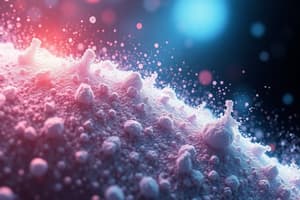Podcast
Questions and Answers
What is one of the primary objectives of comminution?
What is one of the primary objectives of comminution?
- Improve drug stability
- Reduce the weight of crude drugs
- Increase the volatility of drugs
- Aid in the formulation process (correct)
Which manual method of comminution involves rubbing materials into a fine powder?
Which manual method of comminution involves rubbing materials into a fine powder?
- Filtration
- Pulverization by intervention
- Levigation
- Trituration (correct)
What process involves triturating a substance while it is moistened with a liquid in which the powder is insoluble?
What process involves triturating a substance while it is moistened with a liquid in which the powder is insoluble?
- Pulverization
- Trituration
- Levigation (correct)
- Blending
Which mechanical method of comminution uses cylindrical rollers?
Which mechanical method of comminution uses cylindrical rollers?
In the blending process for preparing dosage forms, which technique is commonly employed to ensure uniform mixing?
In the blending process for preparing dosage forms, which technique is commonly employed to ensure uniform mixing?
Which mechanical method of comminution works by the repeated blows of little hammers?
Which mechanical method of comminution works by the repeated blows of little hammers?
What is the purpose of using fluid energy mills in comminution?
What is the purpose of using fluid energy mills in comminution?
Which of the following is a characteristic of pulverization by intervention?
Which of the following is a characteristic of pulverization by intervention?
What is a eutectic mixture?
What is a eutectic mixture?
Which of the following strategies helps to avoid eutectics?
Which of the following strategies helps to avoid eutectics?
What is the primary purpose of dusting powders?
What is the primary purpose of dusting powders?
What is the recommended particle size for granules?
What is the recommended particle size for granules?
Which ingredient is commonly used as a reducing agent?
Which ingredient is commonly used as a reducing agent?
What is one key difference between powders and granules?
What is one key difference between powders and granules?
What characteristic distinguishes bulk powders from divided powders?
What characteristic distinguishes bulk powders from divided powders?
What is the characteristic of effervescent granules?
What is the characteristic of effervescent granules?
Which definition explains micromeritics?
Which definition explains micromeritics?
How are granules typically prepared?
How are granules typically prepared?
How does the particle size of a drug's powder influence pharmaceutical dosage forms?
How does the particle size of a drug's powder influence pharmaceutical dosage forms?
Which of the following vehicles are commonly used in dusting powders?
Which of the following vehicles are commonly used in dusting powders?
Which method enhances the formation of effervescent granulated salts through size enlargement?
Which method enhances the formation of effervescent granulated salts through size enlargement?
What is the primary purpose of trituration in pharmacy?
What is the primary purpose of trituration in pharmacy?
What is the angle of repose used to measure?
What is the angle of repose used to measure?
What is a common method used to reduce the particle size of drugs?
What is a common method used to reduce the particle size of drugs?
Which method involves dissolving drugs and other solids in an ointment base?
Which method involves dissolving drugs and other solids in an ointment base?
What is the correct formula for calculating porosity?
What is the correct formula for calculating porosity?
What is included in the micromeritic properties of particles?
What is included in the micromeritic properties of particles?
Which packaging type is suitable for oral administration?
Which packaging type is suitable for oral administration?
How is bulk density calculated?
How is bulk density calculated?
What should be avoided to prevent effervescent granules from overflowing during mixing?
What should be avoided to prevent effervescent granules from overflowing during mixing?
What is the recommended storage condition for effervescent granules?
What is the recommended storage condition for effervescent granules?
Which value is derived from the true volume and porosity?
Which value is derived from the true volume and porosity?
What is one key characteristic of hygroscopic substances?
What is one key characteristic of hygroscopic substances?
Which technique involves mixing powdered substances without grinding them?
Which technique involves mixing powdered substances without grinding them?
What happens to a crystal hydrate in low humidity conditions?
What happens to a crystal hydrate in low humidity conditions?
What is a characteristic of efflorescent powders?
What is a characteristic of efflorescent powders?
What is the primary use of a volumetric template in powder preparation?
What is the primary use of a volumetric template in powder preparation?
Which method of powder preparation involves grinding the substances to a fine powder?
Which method of powder preparation involves grinding the substances to a fine powder?
Which of the following is NOT a characteristic of an effective chart for powder preparation?
Which of the following is NOT a characteristic of an effective chart for powder preparation?
What defines a deliquescent powder?
What defines a deliquescent powder?
Study Notes
Powders
- Particle's size influences the pharmaceutical dosage forms used to administer a drug
- Smaller particles increase the rate of dissolution and suspension
- Uniformity of particles aids in mixing and distribution
- Larger particles may migrate to the top, while finer particles may migrate to the bottom
- Particle size is crucial for inhalational drugs
Comminution of Drugs
- The process of reducing particle size of a solid substance
- Used for crude drug extraction, increased dissolution rates, formulation, and enhanced absorption
Forms of Comminution
- Manual:
- Trituration: pill tile and spatula, mortar and pestle (porcelain, wedgewood, glass).
- Levigation: trituration with a liquid insoluble in the powder.
- Pulverization by intervention: using a solvent easily removed.
- Mechanical:
- Ball mills,
- Roller mills,
- Cutter mills,
- Hammer mills,
- Colloid mills,
- Fluid energy mills,
- Lyophilization,
- Spray drying
Blending
- A process that tends to result in a randomization of dissimilar particles within a system
- The process should be careful not to expose powders to atmospheric conditions
- Start with the substance present in the smallest amount and gradually add other substances until the entire mixture is uniform
- Geometric dilution can be used
Preparation of Powders
- Spatulation: involves the use of a spatula to mix powders.
- Trituration: process of reducing the particle size of a solid substance.
- Sifting: technique used to separate coarse particles from finer ones.
- Tumbling: mechanical process that uses a rotating container to mix powders.
Preparation Techniques
- Potent Drugs:
- Dosage should be carefully checked and measured before dispensing.
- Incorporation of Liquids:
- Liquids should be added to powders gradually while mixing to ensure proper incorporation.
- Volatility:
- Volatile substances should be carefully handled to prevent loss of potency.
- Hydration, Crystal Hydrates:
- Careful consideration should be given when hydrating powders, due to potential for deliquescence or efflorescence.
- Hygroscopic and Deliquescent Powders:
- These powders easily absorb moisture. Store in sealed containers to maintain product quality.
- Efflorescent Powders:
- These powders lose water of crystallization, becoming powdery. Store in air-tight containers to prevent product deterioration.
- Water of Imbibition:
- Colloidal substances absorb water, affecting weight accuracy.
- Eutectic Mixtures:
- Mixture of components with a melting point less than room temperature and can cause problems with dispensing.
- Eutectic mixtures can be avoided using the following strategies:
- Dispensing powders separately.
- Adding an absorbent powder.
- Keeping ingredients separated.
- Making the eutectic and then adding an absorbent powder.
- Explosive Mixtures:
- Avoid combining oxidizing and reducing agents.
- Oxidizing agents: potassium chlorate, nitrate, permanganate, sodium peroxide, silver nitrate, silver oxide.
- Reducing agents: charcoal, hypophosphites, sulfur, sulfides, tannic acid, volatile oils.
Dusting Powder
- Applied to intertriginous areas to protect the skin from chafing of friction and moisture.
- Absorbent vehicles for dusting powder: Bentonite, kaolin, kieselguhr, magnesium carbonate, starch
- Adhesiveness properties can be achieved by adding aluminum stearate, kaolin, magnesium stearate, zinc oxide, and zinc stearate.
Granules
- Particle size ranges from 4 to 10 mesh.
- Not intended for use with potent drugs due to inherent error in dose measuring.
- Examples: antibiotics for reconstitution.
Granule Preparation
- Prepared by moistening blended powders and passing through a screen or a granulator.
Effervescent Granules
- Contain mixtures of citric acid, tartaric acid or sodium biphosphate with a bicarbonate and a medicinal agent.
- The carbonated solution serves as a pleasant vehicle to reduce bitterness and saltiness.
- Dispensation should be in packets or wide-mouth bottles.
- Examples: Lactinex, Bassoran, Zantac.
Effervescent Granulated Salts
- Fusion Method: Solids are dissolved in an ointment base and then combined by melting the ingredients into the base.
- Wet method: Ingredients are moistened with a non-aqueous liquid to prepare a coherent mass, which is passed through a sieve and dried in an oven.
Micromeritics
- The science of small particles.
Particle
- Unit of matter with defined physical dimensions.
Why study particles?
- A majority of drug dosage forms are solids.
- Solids are not "static" systems.
- Physical state can be altered through manipulation.
- Can alter therapeutic effectiveness.
Measurement of Particle Size
- Microscopic method
- Sieving method
- Sedimentation method
- Elutriation method
- Centrifugal method
- Coulter counter
- Permeation method
- Adsorption method
Micromeritic Properties
- Solubility
- Angle of repose
- True density
- Apparent density
- Porosity
- Void
- True volume
- Bulk volume
- Bulkiness
Packaging/Dispensing
- Oral administration:
- Wide-mouth containers
- Powder papers
- Topical administration:
- Sifter containers
- Puffer units
Storage/Labeling (Powders)
- Store in dry places
- Protect from light
- Keep out of reach of children
Stability
- Dry powders are typically stable.
- USP:
- 6 months if prepared from USP/NF ingredients.
- 25% of the expiration date remaining if prepared from commercial product
Patient Counseling
- Dose measuring technique:
- How to measure a specific dose of the powder.
- Mixing with liquid or food:
- Whether the powder should be mixed with liquid or food, and how.
- Premix and store:
- Whether the powder can be premixed for future use.
- Quantity of powder to apply:
- The appropriate amount of powder to use for application.
- Rub or pat onto skin:
- Whether to rub or pat the powder onto the skin.
- Safety for children:
- Whether the powder is safe for use around children.
- Dry or sweaty skin:
- Whether the powder should be applied to dry or sweaty skin.
Studying That Suits You
Use AI to generate personalized quizzes and flashcards to suit your learning preferences.
Related Documents
Description
This quiz explores the importance of particle size in pharmaceutical dosage forms, including the effects of comminution on drug absorption and dissolution rates. Learn about various manual and mechanical techniques used for reducing particle size and their applications in pharmacology.




